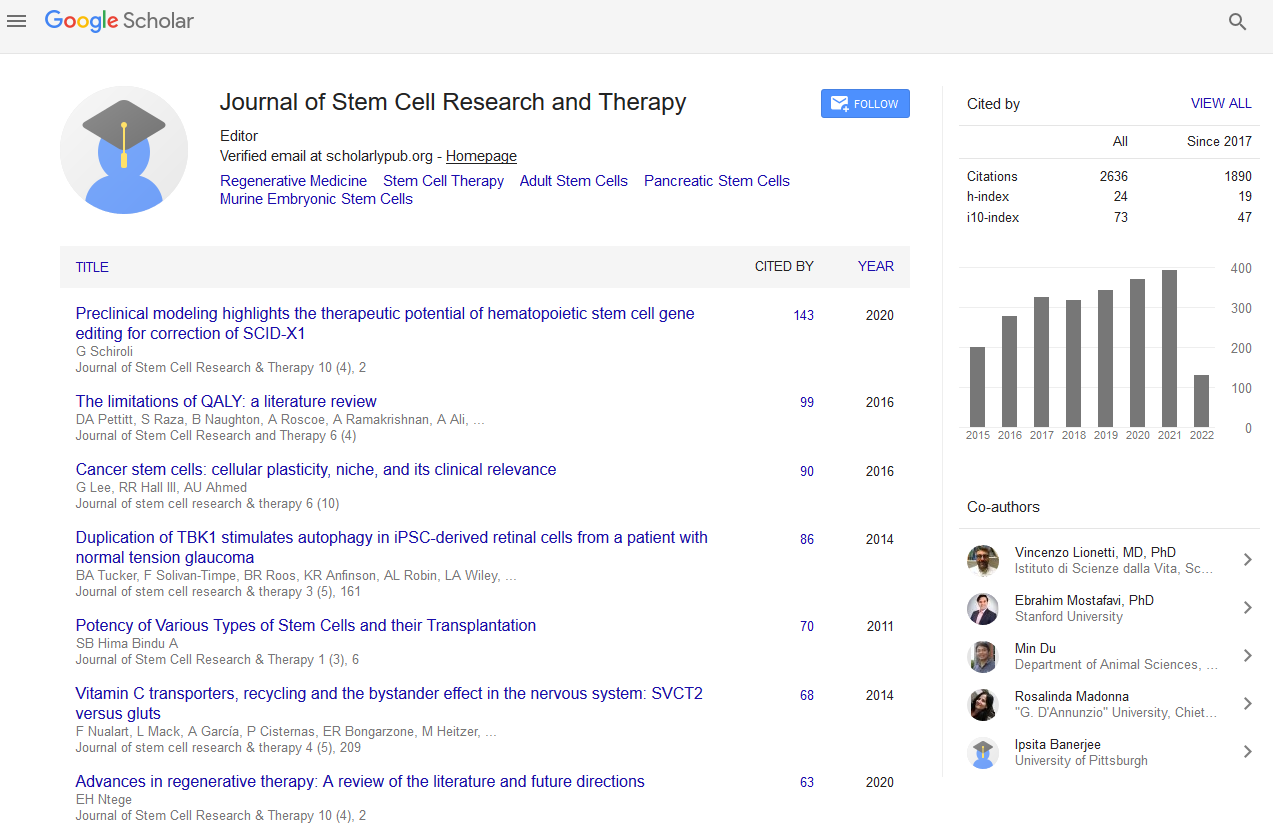Indexed In
- Open J Gate
- Genamics JournalSeek
- Academic Keys
- JournalTOCs
- China National Knowledge Infrastructure (CNKI)
- Ulrich's Periodicals Directory
- RefSeek
- Hamdard University
- EBSCO A-Z
- Directory of Abstract Indexing for Journals
- OCLC- WorldCat
- Publons
- Geneva Foundation for Medical Education and Research
- Euro Pub
- Google Scholar
Useful Links
Share This Page
Journal Flyer

Open Access Journals
- Agri and Aquaculture
- Biochemistry
- Bioinformatics & Systems Biology
- Business & Management
- Chemistry
- Clinical Sciences
- Engineering
- Food & Nutrition
- General Science
- Genetics & Molecular Biology
- Immunology & Microbiology
- Medical Sciences
- Neuroscience & Psychology
- Nursing & Health Care
- Pharmaceutical Sciences
Abstract
Cryopreservation Impacts Cell Functionality of Long Term Expanded Adipose-Derived Stem Cells
Ali El Othmani, Sabrina Rouam, Anass Abbad, Chaimaa Erraoui, Sara Harriba, Hassan Boukind, Jalal Nourlil, Gabriel Malka and Loubna Mazini
Objective: Adipose-Derived Stem Cells (ADSCs) are less immunogenic cells and have a heterogenic cytokine secretion profile making them a better candidate for cell-based immunotherapy. Even innately or stimulated, Interleukin-6 (IL-6) and Toll-like Receptor 2 (TLR2) secreted by ADSC were modulated and led to different inflammatory mechanism pathways through different inflammatory factors secretion. These properties can be very useful in the treatment of inflammation-associated chronic diseases. To be used, ex-vivo ADSC expansion is a critical issue prior to transplantation or cryopreservation. Functional cell changes have been reported during culture expansion being susceptible to interact with freezing/thawing effects leading to doubt on cell therapeutic outcomes. The aim of this study is to identify the effect of freezing/thawing at the different time point of expansion culture on IL-6 and TLR2 secretion.
Methods: ADSC were collected from young female donors, expanded in culture and cryopreserved in Foetal Bovine Serum (FBS) and Dimethylsulfoxide (DMSO) after each passage for 6 months to a year. ADSC was then tested for proliferation, clonogenicity, cytokine gene expression and assessment before cryopreservation (fresh) and after thawing and cultured until confluence (frozen/thawed). ADSC preserved at Passage 0 (P0) were thawed and tested after confluence at P1.
Results: Cryopreserved ADSC as P1 resulted in increased clonogenicity, total RNA and protein secretion compared to the fresh ones. Relative Quantification (RQ) and cytokine assessment of IL-6, IL-10, Tumor Necrosis Factor (TNF)-α and TLR2 revealed a moderate up-regulation of TLR2 while significantly higher IL-6 secretion levels were observed in long term expanded and cryopreserved ADSC.
Conclusion: Our results suggested that cryopreserved ADSC long term expanded in culture were functionally different and might have impaired immunosuppressive properties through modulation of the inflammatory responses by IL-6 and TLR2 activation.


